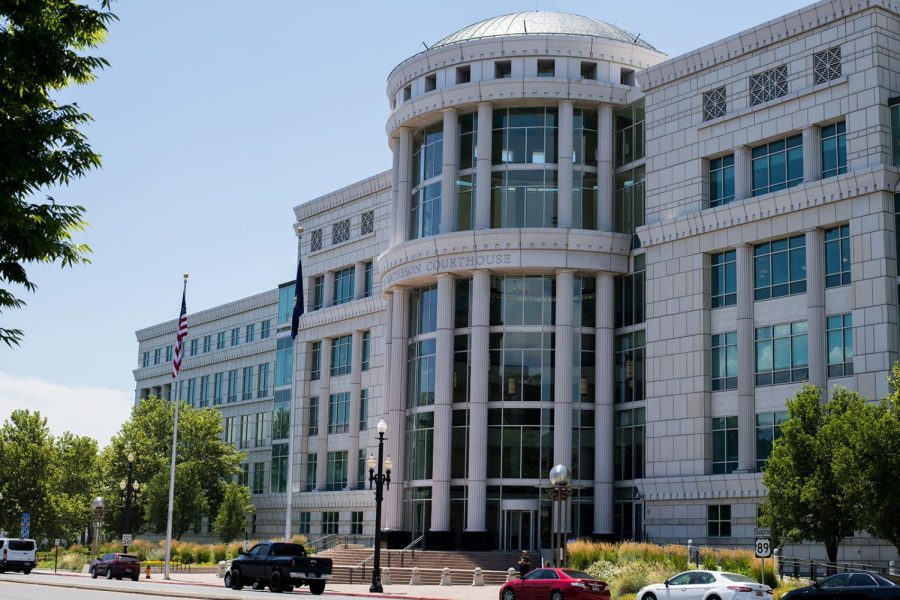Barron: Increasing the Integrity of Convictions Begins with Prosecutors
Scott M. Matheson Courthouse in Salt Lake City on Monday, July 9, 2018. (Photo by Curtis Lin | Daily Utah Chronicle)
March 7, 2020
18 Utah-based convictions have been overturned since 1990 with prison sentences ranging from two years to life, according to the National Registry of Exonerations. Utah has approximately 3,000 prison admissions a year, and it is tempting to believe our wrongful conviction rate is equal to our exoneration rate — about 0.02%. However, a study funded by the Department of Justice estimates that the nation’s wrongful conviction rate is about 11.6%. Utah’s wrongful conviction rate is likely similar, and our exoneration rate is kept low due to the lack of resources available to those fighting their sentences.
In an effort to combat wrongful convictions, Rep. Marsha Judkins has introduced H.B. 324. This bill outlines how Utah’s prosecutorial agencies can establish conviction integrity units to review cases and gives district and county attorneys authority to petition courts on behalf of those wrongly convicted in their jurisdiction. Establishing CIUs across the state and authorizing each CIU’s supervising attorney to act on the unit’s recommendations is a step towards increasing accountability within our state’s prosecution agencies.
A Columbia Law study found that hundreds of prosecutors have hidden evidence in death penalty cases which could have either proved the defendant’s innocence or may have introduced reasonable doubt into the case. While prosecutors have the constitutional obligation to provide the defense with all evidence that is “material” to a case, what is and is not considered material is subjective. Prosecutors also have an incentive to hide evidence that does not fit the case they have built because sharing it can jeopardize their success in court. As Emily Bazelon, an expert on this phenomenon of “guilt by omission,” said, “It’s an honor system. … The defense can’t see [excluded evidence]. And the judge can’t see it either.” The bottom line? Prosecutors are “really making this very important call on their own.”

By establishing CIUs as part of a prosecution agency, Judkins is seeking to ensure these units have open file access to all evidence and records for cases tried by the office, including those which were not entered into evidence or shared with the defense. With this access, CIUs can see if convictions were won based on the exclusion of evidence vital to the defense. In 2017, more than 60% of all wrongful convictions (including 84% of wrongful homicide convictions) involved misconduct like this. Open file access is vital to overturning wrongful convictions. Additionally, the establishment of a CIU will likely decrease future prosecutorial misconduct as prosecutors would be aware that their work may be reviewed.
By advocating for the establishment of CIUs within our state’s prosecution agencies, Judkins’ bill reminds district attorneys, county attorneys and our attorney general of their responsibility to prevent wrongful convictions. Yet, H.B. 324 falls short of promoting total accountability, as the bill does not provide any consequences for prosecutorial misconduct discovered by CIUs.
Currently, when prosecutorial misconduct is identified, there are rarely consequences for offenders. The Northern California Innocence Project found that of the 67 prosecutors that were known to engage in serial misconduct, only six were ever disciplined. As attorneys swear to uphold the Constitution and work honestly for justice, prosecutors who repeatedly engage in unethical conduct to achieve convictions should face serious consequences. Enforcing consequences for prosecutorial misconduct will be key in lowering our future wrongful conviction rate.
During my freshman year, I remember attending a lecture on campus given by Barry Scheck, one of the co-founders of The Innocence Project, a nonprofit which works nationwide to overturn and prevent wrongful convictions. At the beginning of his presentation, Scheck looked around the room, making eye contact with many of the gathered students, before simply stating, “There is far more error than we’d like to believe in our system … and [a wrongful conviction] can happen to anyone.”
By advocating for the establishment of CIUs in our state and providing more prosecutors with the authority to challenge convictions in their jurisdiction, H.B. 324 would move Utah towards a more just criminal system. Passing this bill will begin to decrease the innocent population currently serving prison sentences in the state.
But unless prosecutorial misconduct discovered by any CIU is addressed, there will be little protecting Utahns from unethical prosecutors in the future. To prevent more innocent Utahns from serving time and promote accountability within our prosecutorial agencies, the legislature must pass additional bills with specific, appropriate consequences for prosecutorial misconduct.









David McAtee • Mar 9, 2020 at 9:24 pm
Please WAKE UPPP! The world is upside down and backwards. The good guys ARE the bad guys. Allthat you believe is a lie. The criminals work out of the county courthouses and the fed courts. There is NO government and there is NO law…………there is only MEN WITH GUNS !
DOCILE JIM BRADY • Mar 9, 2020 at 11:40 am
Years ago, not in Utah, a sanction that worked well on alleged prosecutorial misconduct were the
▶️☠️beheadings☠️ of ↙️
▶️Antoine Quentin Fouquier-Tinville and 15 subordinates‼️